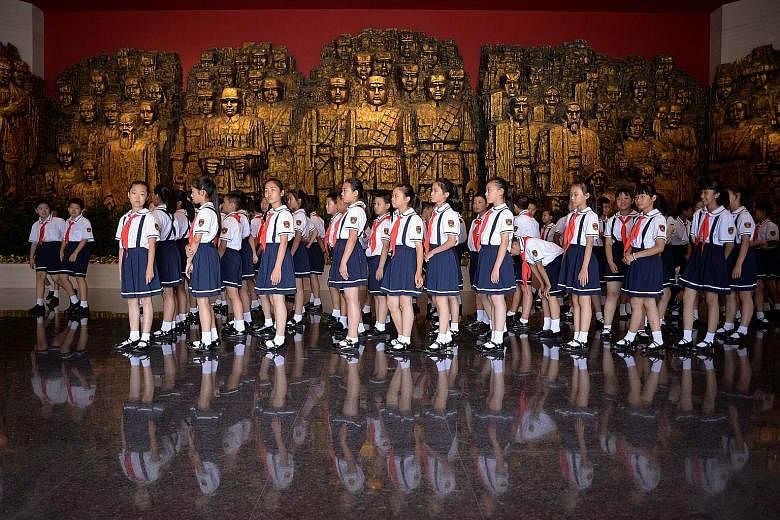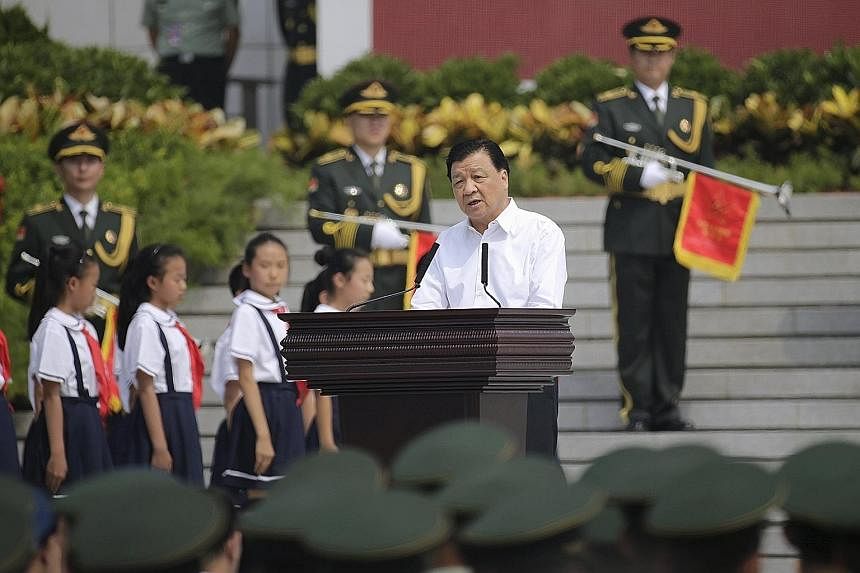China yesterday officially kicked off a series of commemorative activities marking the 70th anniversary of the end of World War II. The low-key manner of events reflects in part its keenness to maintain the warming bilateral ties with Japan.
President Xi Jinping led the Communist Party's apex, seven-member Politburo Standing Committee (PSC) in a visit to a museum near the Marco Polo bridge, south-west of Beijing. The bridge - known as Lugou here - was the venue of a conflict between Chinese and Japanese troops on July 7, 1937, which led to Japan's full-scale invasion that ended after its surrender in 1945. Japan had occupied north-eastern China from 1931.
In a sign of Beijing's low-key approach, Mr Xi, who became the first Chinese leader to attend and speak at the annual July 7 memorial last year, left fifth-ranked PSC member and propaganda czar Liu Yunshan to do the honours.
Mr Liu opened an exhibition called "Great Victory, Historical Contribution" at the museum, which features 1,170 photographs and 2,834 historical relics.
Also, Mr Xi's museum visit was reported only at around 4pm by the official Xinhua news agency, unlike last year when Chinese media outlets reported in advance about his appearance at the memorial.
Primetime news showed Mr Xi giving off-the-cuff remarks after a tour of the Museum of the War of Chinese People's Resistance Against Japanese Aggression.
Mr Xi said the Chinese spirit in fighting the war then as one people is as crucial today, as the country pursues its goals of a moderately prosperous society by 2021, and a strong, harmonious and democratic society by 2049.
"We also need to remember history so as to forge the future. We cannot forget because forgetting is akin to betrayal," he added.
Mr Xi said in his speech last year that China would not agree to any efforts to "deny, distort or beautify history", referring to what it deemed revisionist efforts by Japanese Prime Minister Shinzo over the country's wartime aggression.
Observers say China's low-key approach this year is in view of the rapprochement in Sino-Japanese ties since Mr Xi and Mr Abe met at the Apec summit in Beijing last November and in Indonesia this April.
Political and security dialogue suspended since late 2012 over the Diaoyu/Senkaku island dispute has resumed and exchange visits by officials have become more frequent.
The highlight of China's commemorative activities is a military parade at Tiananmen Square on Sept 3 - the date marks a day after Japan's official World War II surrender in 1945.
"From procedural and diplomatic considerations, it makes sense for this year's (July 7) event to be more low-key," Renmin University foreign policy expert Jin Canrong told The Straits Times.
China is also launching a propaganda blitz featuring 20 documentaries, 12 TV dramas, three animated programmes and at least five films. And there will be photo exhibitions across the world.
Meanwhile, in Tokyo yesterday, members of four Japanese friendship groups gathered to commemorate the 78th anniversary of the beginning of China's eight-year anti- Japanese war, expressing their hopes for peace and friendship.
Former Kamikaze attacker Nobuo Okimatsu noted growing noise within Japanese society that denies the history.
"On the 78th anniversary of the Lugou Bridge incident, Japan should reflect on its past history and consider its future path more than ever," Xinhua quoted him as saying.


